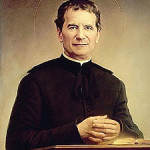 The Salesian Family celebrates St John
The Salesian Family celebrates St John  Bosco’s 200th Birthday this year with many events! As Visitandines we celebrate along with them, especially as Don Bosco also chose our Founder, St. Francis de Sales, as the patron for his new congregation.
Bosco’s 200th Birthday this year with many events! As Visitandines we celebrate along with them, especially as Don Bosco also chose our Founder, St. Francis de Sales, as the patron for his new congregation.
In an article available here:
http://web1.desales.edu/assets/salesian/library/Aubry-Salesians.pdf
the author speaks of the spiritual relationship between these two saints, St John Bosco and his patron St. Francis de Sales.
“Don Bosco and Francis de Sales were actually co-nationals. This is a fact that is usually overlooked, though it is one of the reasons why they were so closely related. Francis was not born in France, but in the duchy of Savoy; and from the mid-sixteenth century up to the Treaty of Turin in 1860 (which ceded Savoy to France) Savoy and Piedmont belonged to the Sardinian States with Turin as the capital. During young Bosco’s formative years, Francis de Sales was venerated as the national saint; clergy and aristocracy spread his culture and the knowledge of his enterprises.
Don Bosco began to know and revere Francis in the Seminary at Chieri, and then at the ecclesiastical boarding college in Turin. These institutes had been placed under the patronage of St Charles Borromeo and St Francis de Sales; and it was here too that the learned and saintly Fr Joseph Cafasso taught – a man imbued with the spirit of St Francis and who encouraged Don Bosco’s apostolate and was his confessor for twenty years.
Memoirs of the Oratory of St Francis de Sales Don Bosco made it abundantly clear why he had chosen Francis as patron and model. His words are important and deserve to be perused. In 1844 Don Bosco was appointed chaplain to the institution of the Marchesa Giulia di Barolo, and she agreed to give him the use of two large rooms – which Don Bosco transformed into his `first Oratory church’. In the saint’s own words, `The name St Francis de Sales was given for two reasons:
- because the Marchesa di Barolo had in mind to found a Congregation of priests under this title and with this intention had a painting of this saint that even today hangs at the entrance of the building; and
- because our ministry demanded great calm and kindness, and had therefore been placed under the protection of this saint. We wanted Francis to obtain from God the grace that would help us to imitate him in his remarkable gentleness and zeal for souls. A further reason was to place ourselves under his protection, so that he would help us from heaven to imitate him in his combating the adversaries of the Church, who were gaining numbers in Italy and especially in Turin’. In his Regulations of 1847 Don Bosco was to speak of the imitation of Francis `in his charity and kindly demeanour’, an attitude so necessary for the success of his educative work.
Don Bosco tells us that he was attracted by two essential aspects of the moral and spiritual characteristics of Francis de Sales:
- his apostolic energy, his zeal for the salvation of souls, his defence of the truth, his fidelity to the Church; and
- the Christlike gentleness that imbued his zeal: his charming manner, his patience, his extraordinary sensitivity.
The vital source of both these qualities is a deep, solid and decisive conviction, namely, that love is the totality of God and the totality of man.”